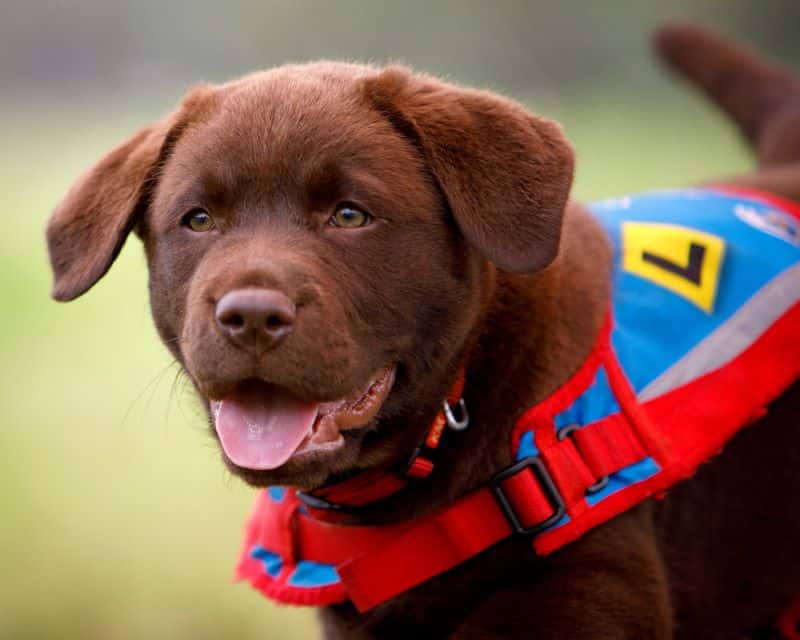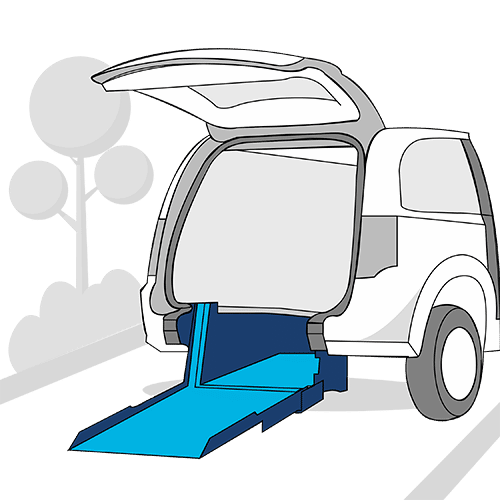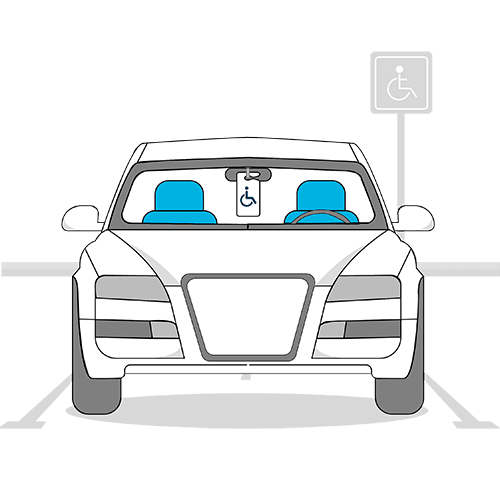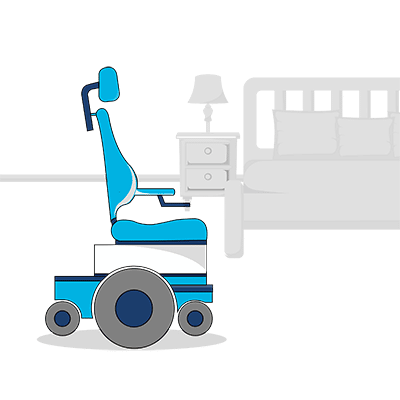Assistance Dogs play a vital role in helping people who live with disabilities to get the most out of life. Just as there are certain breed types that make good Assistance Dogs (read about them in our article on best Guide Dog breeds), particular dog personality traits also count. We’re here to answer the question many people with disability ask: what makes a good Assistance Dog?
There are several different Assistance Dog types, and particular dogs may have particular personalities that better suit being one type more than the other. Dogs who love retrieving, for instance, may be more useful for the rigours of providing physical help for their human than to offer purely emotional support (although they may be excellent at that, too).
When it comes to size, dogs that are bigger may be better at assisting someone with physical disability because they need to be relief upon for physical support. Whereas, a smaller built dog with the right personality can assist as ably with autism as a larger dog with the right personality . Here are the personality traits that make a good Assistance Dog.

#1 of Assistance Dog personality traits: Superfocus
One of the most important Assistance Dog personality traits is that they can ignore external stimuli.
They must travel through all sorts of public spaces with their humans, so it’s vital they focus on their job. People trying to interact with them, encountering food on the street, enticing smells wafting from everywhere, other animals wanting their attention… All these distractions that are usually irresistible to dogs are out of bounds when an Assistance Dog is at work.
Luckily, these pups go through training that teaches them to maintain focus while they’re on the clock. Only dogs who are able to ignore distractions and pass the dog PAT test can go on to be paired with someone living with disability.
Did you know these dogs actually graduate? Read our article on the recent Assistance Dog graduates from Sydney.
#2 They’re intelligent
Assistance Dogs go through two years of comprehensive training to pass their PAT test.
This includes obedience training, socialisation, practice visits, meeting strangers and other dogs, and experiencing odd objects and settings. Smarter dogs – yes, some breeds are more likely to have the right smarts than others – will more easily understand instructions and be able to follow them.
They’re more likely to be adaptable when needed too. A good Assistance dog needs to be capable of quickly adjusting to different situations.
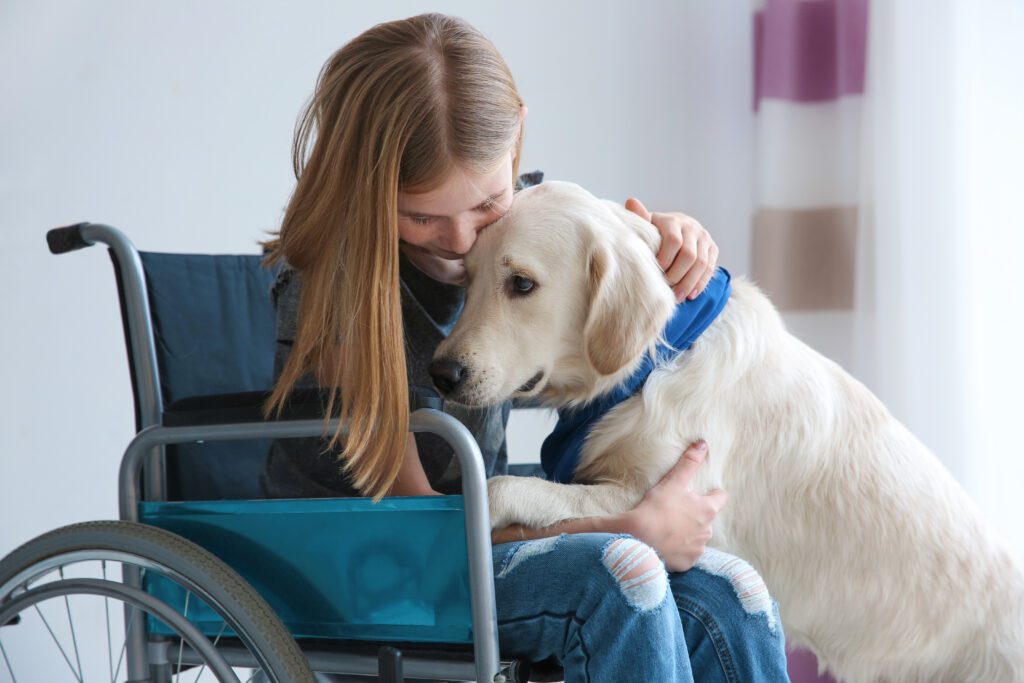
#3 Assistance dog personality traits: Amiable
Another one of the important Assistance Dog personality traits is that they’re social. They must be well used to interacting with adults, small children, and other dogs.
This doesn’t mean that they should run up to the first person or animal they meet and try to make friends, but that they display no aggression or anxiety around others.
Given their human may pat, scratch, and cuddle them regularly, an Assistance Dog also shouldn’t be averse to being touched. Some dogs don’t like being petted or may bite or nip if certain areas of their bodies are touched. Not so with Assistance Dogs – they shouldn’t have any touch sensitivity that could impact their work.
That said, if you come across a dog at work please don’t pet them. Read more in our article: Why Can’t I Pet an Assistance Dog?
#4 They’re extremely calm and patient
Assistance Dogs need to have an almost ‘Zen-like’ disposition. They should be content to sit quietly by their human’s side and enjoy frequent cuddles, ear scratches and belly rubs.
It’s for this reason that older dogs can sometimes make better therapy animals than younger, more excitable pups. Therapy dogs being a different type of support dog to an Assistance Dog, of course.
These pups require a high level of reliability. They need to be predictable while they’re working and not leave their human guessing whether they’ll respond appropriately when given a command – especially when they’re in distracting, stressful situations.
Training helps a dog learn when they’re allowed to be excited versus being calm, but they should already have a calm disposition. Having said that, though a hyperactive, excitable dog may be harder to train, pretty much any dog is trainable with the right techniques.
Even so, not every dog will be capable of being an Assistance Dog. They’re a very special type of canine.
#5 A strong desire to work drives them
Assistance Dogs are eager to please and thrive when they’re being of service.
You get the best result when their training aligns with their innate desire to guide, retrieve, and support. Being on the job 24/7, they need to have enough energy to accomplish that, but not so much that they’re excitable and easily distracted.
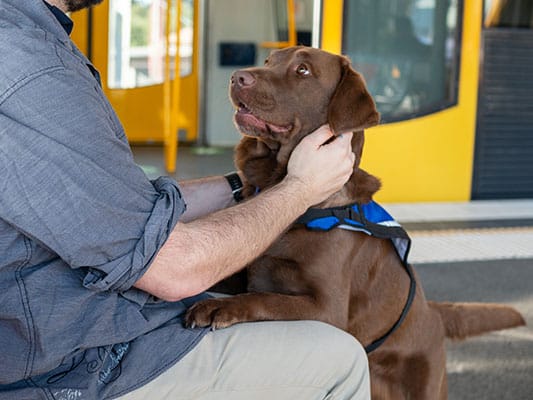
Here’s a roundup from US website Anything Pawsible on other important Assistance Dog personality traits and behaviours:
- Not timid, aggressive, reactive or fearful
- Not extremely submissive or strong willed
- Super balanced, easy going, calm nature
- Enjoy interacting with humans
- Calm and relaxed around other animals (dogs, birds, cats, other small animals)
- Social, but not over the top
- Able to focus even with a lot of external stimuli
- Eager and willing to learn
- Have a high frustration threshold
- Not overly excited about toys or treats
- Relaxed in all environments
- Able to travel readily and don’t show stress in new places
Read about all the amazing things pups do for their human companions on the Assistance Dogs Australia website here. These real-life stories seriously warm the heart.
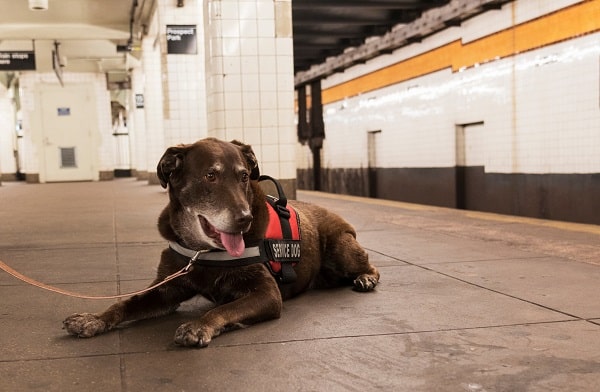
Protect your pup
Now that you know the perfect Assistance Dog personality, did you know that through our sponsorship with Assistance Dogs Australia Blue Badge Insurance donates a percent of every premium to this pawsome cause? This means that as a Blue Badge customer, you’re contributing too.
Not only that, but we offer to cover your beloved pup in case of an accident or illness. Nobody wants to question if they can afford to take their sick or injured dog to the vet. With one of our three pet insurance plans you won’t need to. Plus, we offer 25% off Assistance Dogs insurance and a 15% discount on pet insurance for disability parking permit holders.
Any animal can change our lives for the better, so why not protect them?


